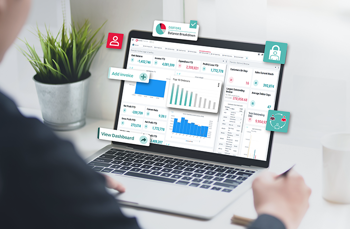4 risks of changing accounting systems and how to do it well
Sometimes we just need to switch. Whether it's our energy provider, our internet service or car insurance, there’s often a right time and a good reason to make the switch.
All these switches have been made easier and hassle free for consumers, but if you think your business needs a new accounting system, then that change might not be as straightforward without the right expert support. This article will provide you with the support you need so continue reading to learn more.
According to a recent industry report, nearly 30% of ERP implementations fail to succeed half of the intended benefits to a company. There are notable cases of this that have gained significant attention. This includes the US Navy, which reportedly spent more than $1bn on several ERP systems, which failed to work.
Your business can avoid ending up in a position like this - if you make key considerations to avoid the risks of changing accounting systems.
Keep reading to discover common changing accounting software problems, what lessons you can learn from other businesses who changed their financial management software, and how to make switching easy with the right accounting systems provider.

The 4 biggest risks of changing accounting systems
The needs, processes and working practices of your finance professionals are unique to them and your business. But there are always key risks to switching accounting software that every business needs to consider no matter how large, what sector they work in and what their underlying business objectives are.
Here are four of the biggest risks to help combat problems when changing accounting software:
1. Not Having Clearly Defined Goals Could Cost You
You can’t choose the right accounting software without clearly defining your goals. Ask yourself why you are switching and what are your expectations after implementation. What is it that you're trying to solve by changing accounting software? Like the example with the US Navy, these issues tend to arise because of the lack of a clear goal or defined goals.
Without those goals at the forefront of your switch, you will already be on the backfoot. And it could cause serious financial headaches for the business and more frustration for your finance team further down the line.
Setting clear goals means you can understand at each stage of your switch the accounting processes like reporting, invoicing and digital tax the switch is looking to improve. You’ll also get a better overall picture of the costs to the business both in the short-term and long-term. This way, you'll be removing one huge risk of changing accounting systems — the lack of vision and objectives.
2. Lack Of A Plan
Every switch to new accounting software should have a detailed and clear plan in place, that’s underpinned by your goals and supported by an expert accounting software partner.
When choosing new accounting software, choosing the right partner is arguably just as important, if not more so. Your partner should be talking you through the risks of switching and working with you on a clear plan that fits the needs of your business and helps you to understand how each stage will work.
If your partner hasn’t done a complete audit of your current system, processes and data and provided key potential pain points in your switching journey and how to overcome them, then you can’t be sure they understand the risks. And if they don't, how will you?
So, ensure your accounting software switch is following a clear plan that’s a collaboration between you and your new accounting software provider. Our checklist for implementing a new accounting system is a useful read.
3. An Inexperienced Person Overseeing the Switch
Every switch to new accounting software should have a detailed and clear plan in place, that’s underpinned by your goals and supported by an expert accounting software partner.
Choosing the right person internally to oversee and manage the switch is just as important as having the right partner.
In 2018, SweetTree Home Care Services made the decision to switch accounting software after evaluating their current system. They concluded their current system didn’t support the business’ ambitions and they also wanted to move to a cloud-hosted solution to remove the need for hosting on site.
Sarah Ghosh, FCMA, CGMA, was finance director of SweetTree Home Care Services at the time. She oversaw the switch and supported the finance team internally with the process. She stated that she had vast experience of implementing software at large organisations, so she knew how to guide her business through the switch.
Not every business will have finance managers or directors that have a history of experience implementing software. So, it might even be worth doing some research and bringing in an outside consultant who can work with your partner to make sure your team is well supported throughout the switch.
4. Migrating Inaccurate Datasets
For most businesses, one of the key benefits of moving to a new accounting system is to move to an improved reporting function. But your reporting can only ever be as good as the data it’s analysing.
Businesses now produce huge sets of data and it can be a real challenge to ensure all this data is 100% accurate and correct. Even if you wanted to, do you have the resource to ensure all data is accurate within the time frame of your switch? The answer is likely to be no.
The solution to this is therefore identifying;
- Which datasets are accurate and needed in the new system?
- Which datasets are needed but require work to bring up-to-date?
- Which are essential to financial reporting and planning?
Your accounting software partner will be able to work with you and your internal switch lead to ensure the right datasets are migrated and are accurate and secure. This will help to ensure that when your business is on the new system, that your finance team can produce fast, accurate reports.
The wrong insights could be more harmful to your business than no insights, so taking the right action on data is vital to a successful switch.
Ultimate Guide To Finance Data For Medium Businesses: Guiding and Influencing Your Business
Many businesses fail to take advantage of their financial data because they lack awareness, find it challenging to implement strategies using that data and struggle with data accuracy and reliability.
Learn how to dominate your market through effective data analysis and decide if switching financial management software is just a cost or a low-risk, high-reward investment for your company.
Download the guide now and shape your medium business's success today!
How to switch your accounting software with ease
Although for every business switching to a new system is unique, there are steps and considerations when changing accounting software all leaders need to consider.
We have picked out five steps that every business should be going through to make switching a reality:
1. Identify your challenges
For every finance team, the challenges they face with day-to-day responsibilities varies. Whether it’s the burden of manual reporting or too much resource focused on tasks like invoicing or expense management, business leaders need to understand the problems finance teams face need solved to switch to the right accounting package.
2. Do your research
Once you’ve identified your challenges it’s time to do your research. Even before you think about speaking to an accounting software provider, you’ll want to gather as much info as you can on their software packages and solutions. Download brochures, take a look at their latest reports and blogs, check out their key team members on LinkedIn - get to know the product you’re interested in even before you’ve had any conversation with the provider.
3. Find the right provider
There are a lot of accounting packages out there. Many are very similar in their functionality and the tools they offer. With SaaS, it’s often the provider who makes all the difference.
What are your product innovation plans? What does your product roadmap look like? Tell me about your downtime policy? What customer service support do you provide? These are just some of the questions you should be asking a provider to start to distinguish between the competition.
4. Understand the risks
Switching accounting systems of course has its risks as we have documented here. Like with any software migration, it’s a complicated process, but the right provider can mitigate risks for you and should have a rigid migration plan in place that suits the needs of you and your business. This plan should include business continuity processes, data protection and training for your team.
Make sure you speak to yours and other finance professionals and businesses in the industry who have migrated systems. Don’t be afraid to ask your new provider if you can speak to other customers of theirs who have recently made a similar journey.
5. Build the case
Once you’ve identified what you want your new accounting software to resolve, found a provider and done your research, it’s about building your case. Like with any outdated software, it’s the user who understands its pitfalls and the frustrations better than anyone so your case should be built around insights from the finance team.
Does your business need new accounting software?
No one will understand when or why your business needs new accounting software better than your finance professionals.
Like with any system, if your current accounting software isn’t evolving with your business and the needs of your finance team, that software can quickly become outdated. It's your finance team who will realise how old accounting software could be damaging your business.
There are many good reasons to need a new accounting system. According to our own survey of 1,000 finance professionals in the UK, almost two thirds who responded named forecasting and budgeting, document processing and payments as their least efficient responsibilities. Simply put, because their accounting software doesn’t have the functionality to streamline these tasks.
In fact, some of the respondents specifically cited their ‘software being too old and slow’ to complete these jobs efficiently.
If your finance team can’t complete their day-to-day responsibilities with ease, then it's the right time to switch. Time wasted on mundane tasks can add up to days each month, and holds your finance team back from focusing on value added tasks like strategic financial planning and supporting the overall business objectives.
So, it’s time for an upgrade. But you have to understand the risks of changing accounting software before you do anything else.
Changing accounting software mid-year: Should you be concerned?
Make no mistake, changing accounting software mid-financial year can be challenging. However, modern, cloud-based accounting software (like Access Financials) comes with automated data migration tools, reducing the risks of data loss.
Additionally, the user-friendly interface can ease the learning curve for your team. If money is the issue, although there may be initial costs, the long-term efficiencies and savings will often outweigh the expenses.
In the end, as long as you and your finance team know exactly what is it that you're looking for in your new accounting system and you work with the right provider, things are most likely to go as planned.
Is your business ready to switch to more powerful and reliable accounting software?
Learn more with our in-depth guide on how to switch accounting systems successfully. If you need support from an expert, get in touch with our friendly team today through our contact form or live chat at the bottom of your screen.
Not yet chosen a new accounting system? Our leading financial management and accounting software is designed to improve business-wide efficiency via advanced functionality and seamless automation. Download a brochure to see all the features or book a demo to view our accounting software in action.
See full guide on how to switch accounting systems
More accounting software information, guidance and advice

How to choose the right accounting software
Go to article
How to implement a new accounting system
Go to article
Cloud vs on-premise accounting software: How do they compare?
Go to article
How much does accounting software cost?
Go to article
Best accounting software for medium-sized businesses
Go to article
How does accounting software work?
Go to articleFrequently Asked Questions
What factors should be considered when choosing an accounting system?
Beyond features, evaluate their product roadmap, downtime policy, customer support, and ability to tailor migration plans to your business needs.
Why is it important to define goals before switching systems?
Without clear goals, businesses risk financial setbacks and implementation failure. Goals help align software capabilities with reporting, invoicing, and compliance needs.
How can I ensure a smooth transition to a new accounting system?
Follow five key steps: identify your challenges, research providers, choose the right partner, understand the risks, and build a strong business case based on finance team insights.
Is Access Financials suitable for mid-market businesses looking to scale?
Yes. Access Financials is designed for growing businesses that need advanced functionality, automation, and real-time insights to support strategic decision-making and operational efficiency.
Can I switch to Access software mid-financial year without disruption?
Absolutely. Access’s cloud-based solutions offer secure, automated migration and intuitive interfaces that reduce downtime and ease adoption - even mid-year.
How does Access help ensure data accuracy during migration?
Access works with your team to identify essential datasets, clean and validate data, and ensure secure migration, so your reporting and forecasting remain reliable from day one.
What kind of support does Access offer after implementation?
Post-implementation, you’ll have access to customer success resources, learning services, and ongoing support to help your team maximise the software’s value.

 AU & NZ
AU & NZ
 SG
SG
 MY
MY
 US
US
 IE
IE
